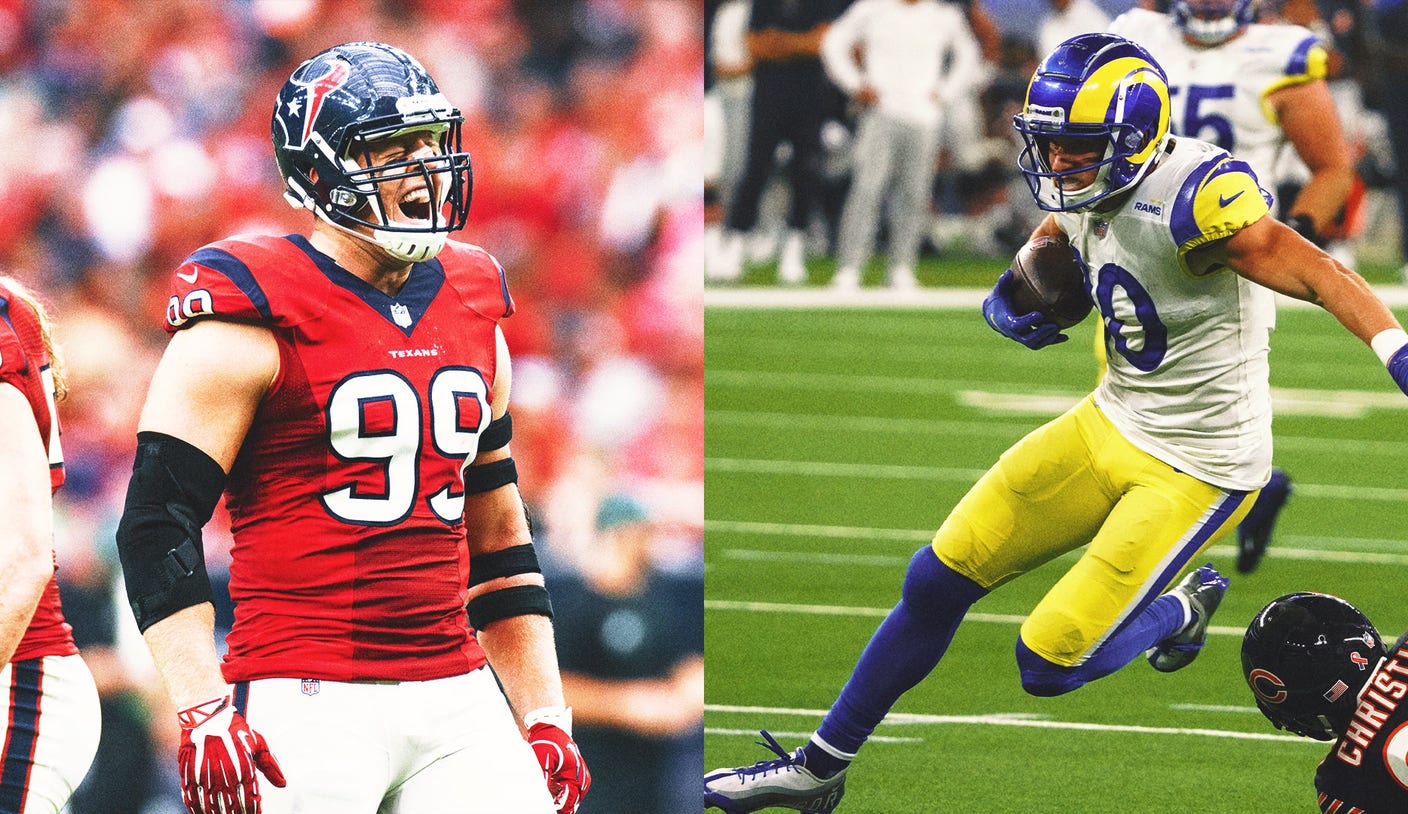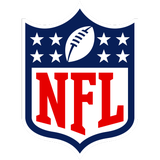
A quarterback has been named NFL MVP every year since running back Adrian Peterson won the award in 2012. There’s a running back who’s making a case to end that streak in 2024, though.
Saquon Barkley has surged up the odds board for MVP after a strong stretch of play. The Philadelphia Eagles star ran for 255 yards in a Week 12 win over the Los Angeles Rams, recording the most rushing yards in a game since 2009. Barkley also had 47 receiving yards, giving him a franchise-record 302 all-purpose yards in the game, to go along with two touchdowns.
[Related: Can Saquon Barkley become first RB to be MVP since 2012?]
Following his 146-yard performance in Week 11, Barkley’s outing on Sunday helped give him the league lead in rushing yards with 1,392. His 6.2 yards per carry is also the highest in the league among running backs who qualify, and he’s fourth in rushing touchdowns (10). He’s added 33 receptions for 257 yards and two touchdowns, proving to be a seamless fit with the Eagles after leaving the New York Giants in the offseason.
Barkley is currently on pace for roughly 2,150 rushing yards, which would break Eric Dickerson’s single-season rushing record of 2,105 yards, a mark that has stood since 1984. It’s probably unrealistic to expect Barkley to keep up that rate, but it might not be unrealistic to think he could become the first non-quarterback to win MVP in 12 years.
Let’s take a look at the five non-quarterbacks who came the closest to winning MVP since Peterson’s historic 2012 season.
Only two defensive players have ever won MVP. J.J. Watt made a strong case to be the third in 2014.
The Texans icon dominated opposing offensive lines that season. Watt recorded 20.5 sacks to go with 59 total tackles. He also led the league in fumble recoveries, scooping up four of them and returning one for a touchdown. He had a league-leading 29 tackles for loss to go with five forced fumbles that season. Additionally, he recorded an interception, which he returned 80 yards for a touchdown.
Watt’s 2014 season was historic by Pro Football Focus’ standards. He recorded 119 pressures that season, the most pressures ever recorded by a player since PFF began tracking the stat in 2006.
Additionally, Watt made some contributions on offense that season. While he didn’t have Travis Hunter-like two-way production, he had three receptions, all of which were touchdowns, as Houston deployed him as a tight end in special goal line packages.
It took a special year from Aaron Rodgers to edge Watt for MVP. The former Green Bay Packers quarterback threw for 4,381 yards, 38 touchdowns and five interceptions that season to go with a 112.2 passer rating, 269 rushing yards and two touchdowns. Rodgers also led the Packers to a 12-4 season that year, winning the NFC North, while Watt’s Texans went 9-7 and missed the postseason.
Rodgers wound up winning 31 of the 50 first-place votes that year. Watt won 13 of the first-place votes, which was the highest vote share a defensive player has had for MVP since Lawrence Taylor’s win in 1986.
Watt settled for his second Defensive Player of the Year Award that year.
J.J. Watt arguably had the best season for a defensive player in 2014. (Photo by Cliff Welch/Icon Sportswire/Corbis/Icon Sportswire via Getty Images)
After Cam Newton’s dominant win in 2015, there was much more debate over the MVP in 2016.
Ezekiel Elliott, who was a rookie, was among the handful of players in the MVP conversation that year. The running back, along with fellow rookie Dak Prescott, helped turn the Cowboys from one of the worst teams in the league to a 13-3 squad that finished first in the NFC East.
The fourth overall pick in the 2016 NFL Draft nearly set rookie records as he was dominant on the ground. Elliott rushed for a league-high 1,631 yards on 5.1 yards per carry in 15 games. His 1,631 rushing yards were the third-most ever for a rookie. As he was 21 at the time, Elliott also became the youngest player to ever rush for 1,600 yards in a season.
Elliott found the end zone 15 times in 2016, finishing third in rushing touchdowns. He was also a contributor in the passing game, recording 32 receptions for 363 yards and a touchdown as he nearly had 2,000 all-purpose yards that season.
Ultimately, Elliott’s remarkable rookie season wasn’t enough for him to break through in a season that didn’t have a clear top quarterback. Former Atlanta Falcons star Matt Ryan won the award, throwing for 4,994 yards, 38 touchdowns and seven interceptions with a league-high 117.1 passer rating en route to an 11-5 season that ended with a Super Bowl trip.
But Ryan only won 25 of the 50 first-place votes, making it one of the least dominant MVP wins in recent memory. Elliott earned six first-place votes, finishing tied for third. While Elliott earned more MVP votes, Prescott actually won Offensive Rookie of the Year that season, so Elliott didn’t win any of the major awards that season.
Ezekiel Elliott immediately turned the Cowboys around in 2016. (Photo by Cliff Welch/Icon Sportswire via Getty Images)
2017: Los Angeles Rams RB Todd Gurley
Similar to the 2016 MVP race, the door was briefly left open for a running back to win MVP in 2017.
Todd Gurley shined in Sean McVay’s offense in his first season with the new Rams head coach, proving to be a dual-threat monster. He rushed for 1,305 yards on 4.7 yards per carry and a league-best 13 touchdowns. He added 64 receptions for 788 yards and six touchdowns, making him the league leader in yards from scrimmage and total touchdowns that season.
The emergence of Gurley helped Jared Goff become one of the league’s top passers that season. In turn, that helped Los Angeles go from a 4-12 season to winning the NFC West in 2017.
Gurley’s strong season wasn’t enough for him to take home MVP, though. Philadelphia Eagles quarterback Carson Wentz, who was the favorite to win the award for much of the season, went down with a season-ending injury in Week 14. Voters opted to give the award to New England Patriots quarterback Tom Brady following the late-season development. Brady had another strong year in 2017, throwing for a league-high 4,577 yards to go with 32 touchdowns, eight interceptions and a 102.8 passer rating.
Brady won 40 of the first-place votes in a relatively decisive victory, but Gurley finished second with eight votes.
Todd Gurley had a strong season in 2017 that earned him MVP votes, but not enough to top Tom Brady. (Paul Moseley/Fort Worth Star-Telegram/Tribune News Service via Getty Images)
2021: Los Angeles Rams WR Cooper Kupp
Quarterback dominated the MVP vote between the 2018-20 seasons. Patrick Mahomes won in his first season as a starting quarterback in 2018, while Lamar Jackson became just the second player to ever win the award unanimously in 2019. Rodgers added his third MVP win in 2020.
The MVP vote in 2021 ultimately came down to two all-time greats at quarterback, but Cooper Kupp made a strong case to play spoiler. The Rams wide receiver became the fourth player since 1970 to win the receiving triple crown, leading the league in receptions, receiving yards and receiving touchdowns. Kupp had 145 receptions that season for 1,947 yards and 16 touchdowns. His reception and receiving yard totals were the second-most in NFL history.
Kupp’s play helped the Rams win the NFC West that season and ultimately a Super Bowl. However, it wasn’t enough for him to top Rodgers or Brady to win MVP. Rodgers threw for 4,115 yards, 37 touchdowns and four interceptions to help the Packers go 13-4 en route to finishing with the best record in the NFC. That won him 39 of the MVP votes to win the award. Brady finished in second with 10, while Kupp received just one vote to finish in third.
At the time, winning MVP was a bad omen for your team’s postseason hopes as the MVP winner’s team didn’t win the Super Bowl in the same season from 2000-21. So, maybe it was for the best for Kupp not to win MVP that year. He also won Offensive Player of the Year and Super Bowl MVP, which are pretty good consolation prizes.
Cooper Kupp had eight catches for 92 yards and two touchdowns in Super Bowl LVI, winning Super Bowl MVP. (Photo by Keith Birmingham/MediaNews Group/Pasadena Star-News via Getty Images)
For a good portion of the 2023 season, it seemed like the race for MVP was going to come down to two non-quarterbacks. Miami Dolphins wide receiver Tyreek Hill was on pace for a record-setting season before tailing off in the final month of the year.
Christian McCaffrey, meanwhile, was strong from start to finish. The 49ers star arguably had the best running back season since Peterson’s win in 2012, rushing for 1,459 yards on 5.4 yards per carry and 14 touchdowns in 16 games. He also had 67 receptions for 564 yards and seven touchdowns, proving to be a legitimate receiving threat for Brock Purdy. He finished the year with a league-leading 2,023 yards from scrimmage and 21 total touchdowns.
As McCaffrey was essential to the 49ers’ success en route to their 12-5 season, he was viewed as one of the two favorites to win the award entering Week 16. In fact, the Week 16 matchup between the 49ers and Ravens that season was viewed as a game that would determine who’d win MVP as Jackson was having another strong season. Even though McCaffrey rushed for 104 yards and scored two touchdowns, the 49ers lost that game, 33-19.
Jackson wound up winning the award. He threw for 3,678 yards, 24 touchdowns and seven interceptions to go with a 102.7 passer rating, and rushed for 821 yards and five touchdowns to help the Ravens go 13-4. Jackson actually dominated the vote, winning 49 of the 50 first-place votes. Prescott received the other first-place vote.
McCaffrey was awarded Offensive Player of the Year in 2023 and helped the 49ers reach the Super Bowl.
49ers RB Christian McCaffrey was among the favorites to win MVP for much of the 2023 season. (Photo by Robin Alam/ISI Photos/Getty Images)
[Want great stories delivered right to your inbox? Create or log in to your FOX Sports account, follow leagues, teams and players to receive a personalized newsletter daily.]

Get more from National Football League Follow your favorites to get information about games, news and more



